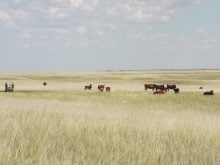The Canadian Food Inspection Agency is doing everything it can to keep African swine fever out of the country, but it doesn’t intend to ban imports of plant-based feeds.
“It’s not proven, but we do think it (imported feed) could be one of the sources that can bring ASF virus with it,” said Jaspinder Komal, CFIA vice-president of science and chief veterinary officer for Canada.
In January, the CFIA created a working group of veterinarians, feed experts, government and pork industry representatives to study imports of plant-based feed.
Read Also

Beef check-off collection system aligns across the country
A single and aligned check-off collection system based on where producers live makes the system equal said Chad Ross, Saskatchewan Cattle Association chair.
The working group will consider a variety of actions on how to reduce the risk of ASF arriving in Canada. Then the group will make recommendations to the CFIA.
“I can’t tell you the exact timeline, but we’re talking weeks rather than months or years,” Komal said. “It is urgent and once the group has come up with options … we’ll move forward very quickly.”
ASF is spreading through pig herds in China, Eastern Europe and Russia and was recently detected in Vietnam. The disease causes fever, lethargy and lack of appetite in pigs, and herds infected with ASF have a much higher death rate compared to those infected with other diseases.
Infected animals spread the disease through direct contact with other pigs.
One of the primary vectors is infected meat. Humans are moving the virus by transporting meat and feeding it as scraps to pigs.
Other vectors include wild boars, which could come in contact with swine herds, and imported feed ingredients, such as amino acids.
If the disease arrives in Canada, it would likely shut down exports of Canadian pork and millions of pigs could be euthanized.
Research carried out in Minnesota has shown soybean meal and other feeds could bring the virus into North America.
“In our model, viable ASF virus was recovered 30 days post-inoculation from conventional and organic soybean meal, soy-oil cake, choline, three types of pet foods, pork sausage casings and complete feed,” Scott Dee, a research veterinarian, wrote in National Hog Farmer in 2018.
Canadian and U.S. farmers produce an abundance of soybean, corn and barley, so conventional plant-based feeds are rarely imported. But the organic sector imports feeds from Eastern Europe, China and other places where ASF is a major problem.
Some of the organic grain imports come from unknown sources or through third-party agents. A small percentage of shipments are not actually organic.
“The situation is kind of the biggest non-secret in the (organic) business,” said Eric Jackson, chief executive officer of Pipeline Foods, an American firm.
Organic livestock producers in North America buy imported feed from places like Bulgaria because it’s cheaper than domestic feed.
Seeing how Canada’s pork industry generates $13 billion annually in economic activity, the cost of ASF likely outweighs the benefit of organic producers saving a few bucks on imported feed.
However, the CFIA is cautious when it comes to import bans and interfering with the market.
“It’s market conditions that dictate where producers are going to procure these ingredients,” Komal said.
A ban isn’t likely, but the working group may recommend a quarantine in which the imported feed is stored at 20 C for 20 days or 10 C for 100 days to kill the virus.
The working group still has to make recommendations and the CFIA will need to implement the proposals, which could take some time.
Meanwhile, the CFIA is doing everything possible to mitigate the risk. That includes sniffer dogs at airports to detect travellers arriving with meat and encouraging importers to buy feed from trusted companies — like those certified by the Animal Nutrition Association of Canada Feed Assure program, Komal said.
“We have existing strong import measures from countries of concern with respect to ASF … that includes animal feed and feed ingredients.”

















